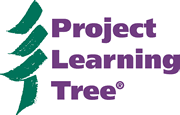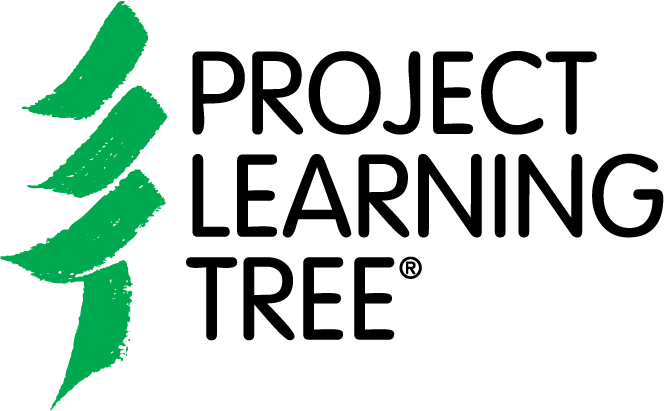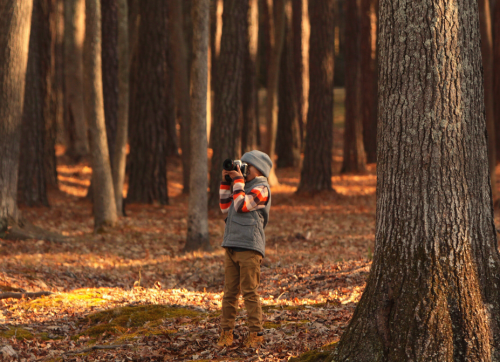
Many PLT activities are easily adapted to virtual learning, as we illustrate below and with previous Virtual Makeovers articles: Sounds Around and Looking at Leaves. Whether you already have a favorite PLT activity or are new to PLT, check out these “twists of the trade” suggested by PLT coordinators.
This month, Colorado PLT Coordinator Danielle Ardrey shares how to adapt the PLT Activity “The Closer You Look.” It is Activity 61 in the PreK-8 Environmental Education Activity Guide and can also be found in our Sensational Trees for grades K-2 and our Nature Activities for Families collection.
In addition to reading the activity description below, you can watch a short video that Danielle created to see the activity demonstrated.
Activity Overview
The Closer You Look drives home a great lesson about the power of observation.
It allows students to compare what they think they remember about a tree with what they capture when they look closely at it.
It’s simple to set up and to conduct, and should take about 50 minutes, spread over a few periods. Students will need paper; pencils or pens; and crayons, colored pencils, or markers.
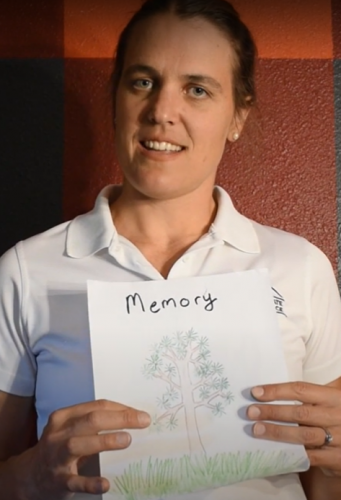
Picturing a Tree from Memory
About 50,000 varieties of trees exist around the world, from small bluejack oaks native to the Atlantic and Gulf Coasts to the towering redwoods of California and Oregon.
Ask students to close their eyes and picture a favorite tree. As they do, ask them to envision the shape, feel, color, and size of different parts of the tree, including:
- Trunk
- Bark
- Branches
- Leaves
- Seeds, fruits, or flowers
- Plants or animals on the tree
Eyes open! Now ask them to transfer those thoughts to a drawing they make of the tree.
Ask students to share their pictures with the group. Besides describing their picture, you might ask them why the tree is important to them.
-
- Is it in a favorite place?
- Is it associated with a family memory?
- What makes it special to them?
Students then further transfer the details to the graphic organizer included in the activity. You can provide the template to your students or ask them to create their own version making sure they include the categories below.
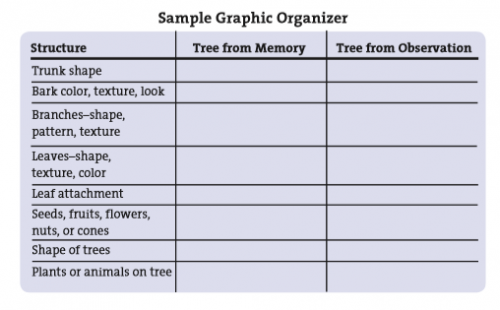
Observing a Tree
Now it’s time to get outdoors to the tree they envisioned or, if it’s far away or inaccessible, a nearby tree. If they can’t get outdoors, they could use a houseplant. They could also look online for a photograph, although the details and feel will not be as sharp.
As they are “face-to-trunk” with the tree, chances are they will observe things that differ from the memory they held.
Specify the length of time you want students to make observations next to their tree—depending on the grade, perhaps 5-15 minutes. Tell them to pay attention to as many details as possible, details they may forget about when conjuring up the tree from memory.
Students should draw a picture of the tree and also fill in their graphic organizer.
In a group discussion or as a written exercise, students can point to the differences between their two versions of their tree. If they have looked at a different tree than the tree they originally imagined, they can still address the different levels of detail gained from first-hand observation.
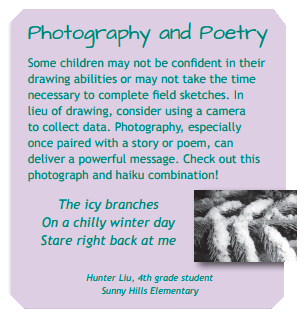
Option: Tree Yoga
Danielle suggests some fun motions to “be” a tree (watch around minute six of her video to see an example.) If your students need a break from sitting, they can also do this indoors!
Option: Creating a Model
Students can create a model of a tree using construction paper, toilet paper rolls, straws, foil, tissue paper, and whatever other materials they have at home. Ask them to label the parts of the tree as well.
Option: Language Arts
Ask students to write a poem (haiku, anyone?) or other creative work about the tree.
Assessment Opportunity
Ask students to write a response to this question:
“Did your second picture show a greater understanding of the tree’s structure and form?”
They should support their answers with observations from their graphic organizer.
Recap of Resources
- PreK-8 Environmental Education Activity Guide, Activity 61 – The Closer You Look
- Sensational Trees Activity Collection for grades K-2
- Danielle Ardrey’s video demonstration of the activity
- Remote-ready educator instructions and student pages
- Ideas for nature journaling your trees
- Instructions for an easy-to-make model of a tree
What’s Your Idea?
We would love to hear how you have adapted this or other PLT activities with your students. Drop us a line—and look for additional activities next month in the Branch!
Want to try an abridged version of this activity at home? Our Closer You Look Family Activity (available in English and Español) is great to try in your own backyard or nearby park or trail!
PLT also offers online, blended, and in-person professional development tailored for specific grade levels, academic standards, environmental topics, and formal and nonformal teaching situations. During COVID-19, many PLT State Coordinators now offer remote professional development to model ways educators can work with students virtually, including adaptations to PLT activities. Learn more.
